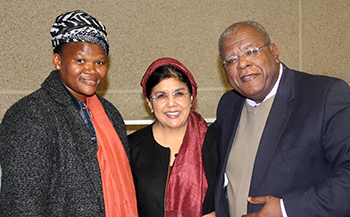Latest News Archive
Please select Category, Year, and then Month to display items
30 October 2018
|
Story Rulanzen Martin
|
Photo Peet van Aardt
 Some of the student writers who contributed to the anthology that tells their stories in Sesotho, isiXhosa, isiZulu, English and Afrikaans.
Some of the student writers who contributed to the anthology that tells their stories in Sesotho, isiXhosa, isiZulu, English and Afrikaans.
How do you transform the higher education curriculum? You involve the exact people the curriculum is intended for. The book, Initiative for Creative African Narratives (iCAN,) illustrates how decolonisation can be achieved through literature for students by students.
iCAN is an initiative by the Centre for Teaching and Learning (CTL) at the University of the Free State (UFS) to mentor students in creative and narrative writing. Under the mentorship of Dr Peet van Aardt, project coordinator, and Ace Moloi, author and UFS alumnus, iCAN Volume 1 was recently launched with 47 short stories written by UFS students.
“The project is a response from the centre for the ever-increasing need for decolonised curricula, steeped in the local cultural perspective of ubuntu,” said Dr Van Aardt.
“This book is an example for how decolonisation can be implemented,” said Prof Francois Stydrom, Senior Director of CTL. The overall aim of the iCAN project is to have the content that materialised from it to be included in the curriculum of first-year students at UFS in the near future.
Book provides multiple voices
Starting in May 2018, CTL presented a series of creative writing workshops on all three of the UFS campuses. “It’s a medium that allows a diverse range of students to express their views and develop their voices as writers,” said Prof Strydom.
It is a form of empowerment, to pass the baton to students to improve the UFS curriculum by writing and publishing their own stories, thereby contributing to larger bodies of knowledge through their lived experiences.
“I believe we as a university need to enable students so that they move away from just being users to becoming contributors to the curriculum,” Dr van Aardt concluded.
Beauty personified through written word
2016-07-29

Dr Thozama April, University of Fort Hare
historian, Zubeida Jaffer, current Writer-in-Residence
in the Department of Communication Sciences
at the UFS and author of Beauty of the Heart:
The life and times of Charlotte Mannya Maxeke
and Prof Jonathan Jansen, Vice-Chancellor and Rector
of the UFS at the book launch of Zubeida Jaffer.
Photo: Rulanzen Martin
“It is quite easy to write a book in a professional capacity but very difficult to write a book from the heart.”
These were the words of Prof Jonathan Jansen, Vice-Chancellor and Rector of the University of the Free State (UFS), at the launch of Beauty of the Heart: The life and times of Charlotte Mannya Maxeke by Zubeida Jaffer, the current Writer-in-Residence in the Department of Communication Sciences at the UFS.
Perseverance and dedication yields results
Writing a book from the heart is exactly what Jaffer, an award-winning South African journalist and author, set out to do. “When you make the choice to write a story, you need to be very dedicated,” she said.
As this is Jaffer’s third book, one would think that she would have no difficulty in putting pen to paper. On the contrary, she mentioned that it was, in fact, the hardest book she has written because the narrative was not easy to get hold of.
“I wanted Charlotte’s voice to come through, and it took my team and I three years of research and writing,” she said.
Maxeke’s story helps to shape South African society
The three-person panel, hosted by the UFS Sasol Library and SUN MeDIA, and chaired by Prof Jansen, included Jaffer and Dr Thozama April, University of Fort Hare historian who had done her PHD thesis on Maxeke.
Dr April said that Maxeke’s life story is an inspiring one, as it encourages a rethinking of established narratives. “These established narratives have made it possible for historians and researchers to write about the shaping of South African society,” she said.